Looking for the best e-commerce platform to sell your products online? Well, I got a bunch of ideas for you.
An ideal e-commerce platform offers you a place to sell and provides standard features such as inventory management, beautiful templates, and, most importantly, third-party integrations.
In short, there are two types of e-commerce platforms – hosted and self-hosted. A hosted e-commerce platform provides you with an all-in-one solution for your online store. Hosted platforms handle everything, such as software improvement, bug fixes, and security updates.
On the other hand, self-hosted platforms rely upon you. If you encounter any problem, you have to handle things by yourself.
In this post, I will list the 13 best eCommerce platforms for your online store. This is a mixed-up list of hosted and self-hosted platforms. I have also included basic features, pricing, and their pros and cons that will help you compare each platform.
Let’s get started.
Top 14 E-commerce Platforms: In A Nutshell (2025)
If you are in a hurry and want quick suggestions, here’s an overview of my top picks.
| S.No. | Ecommerce Platform | Starting Price | Best For |
| 1. | Shopify | $29/month | All types of business sizes |
| 2. | Wix | $23/month | Beginners and intermediates |
| 3. | BigCommerce | $29.95/month | Enterprise level merchants |
| 4. | Weebly | $12/month | Online and offline selling |
| 5. | Adobe Commerce (Magento) | Custom | Sellers with coding skills |
| 6. | WooCommerce | Free | WordPress users |
| 7. | Squarespace | $16/month | Technical and non-technical sellers |
| 8. | Big Cartel | $9.99/month | Artists and handmade sellers |
| 9. | PrestaShop | Free | Tech-compliant sellers |
| 10. | Zyro | $11.99/month | Small businesses |
| 11. | Square Online | Free | Online and POS sellers |
| 12. | Ecwid | $19/month | Online and social media sellers |
| 13. | Shift4Shop | $29/month | Start-ups and businesses with low budget |
| 14. | Volusion | $35/month | Anyone who wants to start a dropshipping business |
Here is a detailed overview of the 14 best e-commerce platforms. Each platform has its business model and unique features that will help evaluate your business.
1. Shopify
Shopify is undoubtedly the most popular e-commerce platform in the world. It is a SaaS platform with standard features and tools for cross-platform selling and dropshipping. Over the years, Shopify has constantly been improving to provide you with the best e-commerce experience.
Shopify has a number of extension libraries of tons of apps, so you can run your store better. Since the platform is self-hosted, you don’t have to worry about security improvements or bug fixes. Each problem will be taken care of, or if you are still not satisfied, you can contact their customer service staff, and they will help you fix the problem.
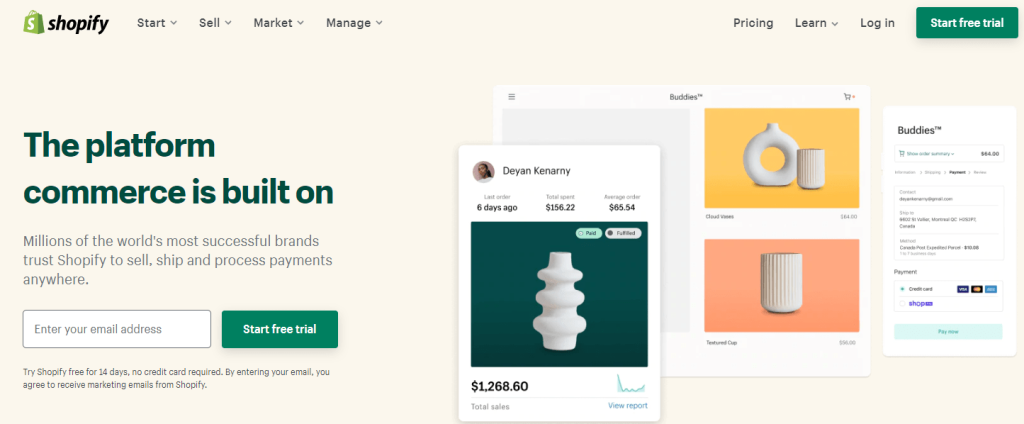
You don’t have to be very tech-savvy to run a store on Shopify. Shopify’s mobile app and payment processor are flexibly designed, making it super user-friendly. With these features, you can access it at any skill level and ship orders without any hassle.
If you are a professional and looking forward to scaling your business, you can try Shopify’s Advanced plan to unlock the unmatched features and add-ons. It will not just make your store look better but also help you grow your sales within no time. They also offer unlimited bandwidth and storage without any additional charges, so you never have to worry if your store gets sudden traffic.
Shopify offers a 3-day free trial to their premium plans with no credit card required. So, you can try the platform without paying a single penny before going for the paid plans.
Pros
- Sell unlimited products on multiple marketplaces.
- International market management tools help you sell globally.
- Create fast-loading sites
- 14-day free trial with no credit card required.
- Built-in marketing tools
Cons
- Adding plugins is necessary even for basic features such as credit card payment.
Pricing
Shopify’s Basic plan starts at $29/month, and you can upgrade it to the Shopify plan at $79/month. There is an Advanced plan for enterprise-level merchants that costs around $299/month.
2. Wix
If you are a beginner or not that technically competent, Wix is undoubtedly the best option for you. It is a free website building and web hosting platform, but its paid plan offers exceptional e-commerce features. You can build your website for free, but you have to upgrade to a premium plan to unlock its e-commerce features.
Once you upgrade to a premium paid plan, you can start selling on your own store and use its features such as multilingual sites, custom shipping rates, subscription products, currency conversion, and digital product downloads.
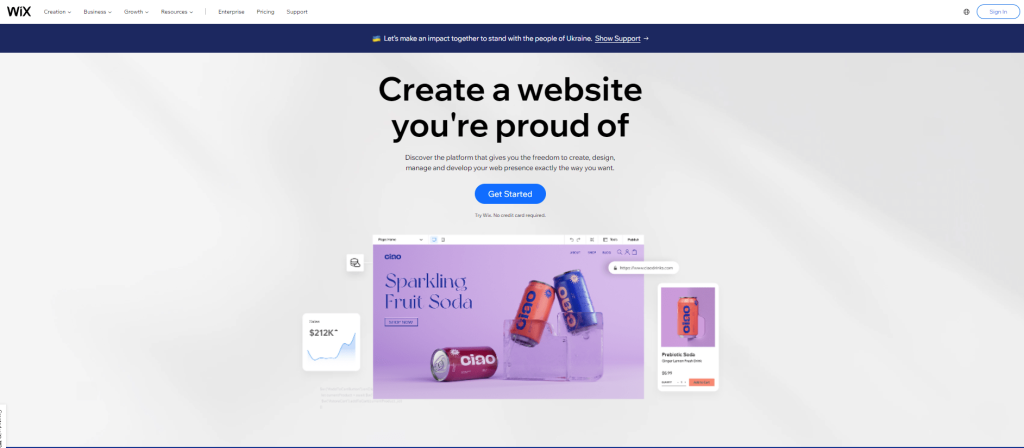
The platform has a drag-and-drop feature which makes it user-friendly. In terms of colors and aesthetics, it is fully customizable. Wix offers a range of free templates that you can use to design your website. You can also tweak the templates according to your brand if necessary.
Talking about its e-commerce functionality, Wix provides a few helpful tools to merchants, such as order tracking, online payments, creating abandoned cart campaigns, and cross-platform selling. The platform lacks certain features such as essential inventory management features and low stock alerts when it comes to product-based business. If you have more than ten types of products to sell, you may want to use a better platform that offers more powerful features and integration.
Pros
- The platform is fully customizable.
- Create your store easily with the drag-and-drop editor.
- Cross-platform selling feature
- 24/7 premium support for any query
- Free forever plan included
Cons
- E-commerce features are only included with premium plans
- Not site-transferring feature
Pricing
Wix’s Basic plan starts at $23/month, and the Unlimited plan starts at $27/month if paid annually. The VIP plan costs around $49/month that offers you advanced eCommerce features.
3. BigCommerce
BigCommerce is an excellent platform for marketed and enterprise-level businesses. The platform also offers web hosting services and tons of customization options like Wix and Shopify. However, you have to purchase and register your domain from elsewhere before porting it here.
BigCommerce offers essential e-commerce features such as great SEO, advanced product filtering, minimal downtime, targeted customer marketing, and third-party marketplaces. Through this platform, you can also sell on various social media marketplaces.
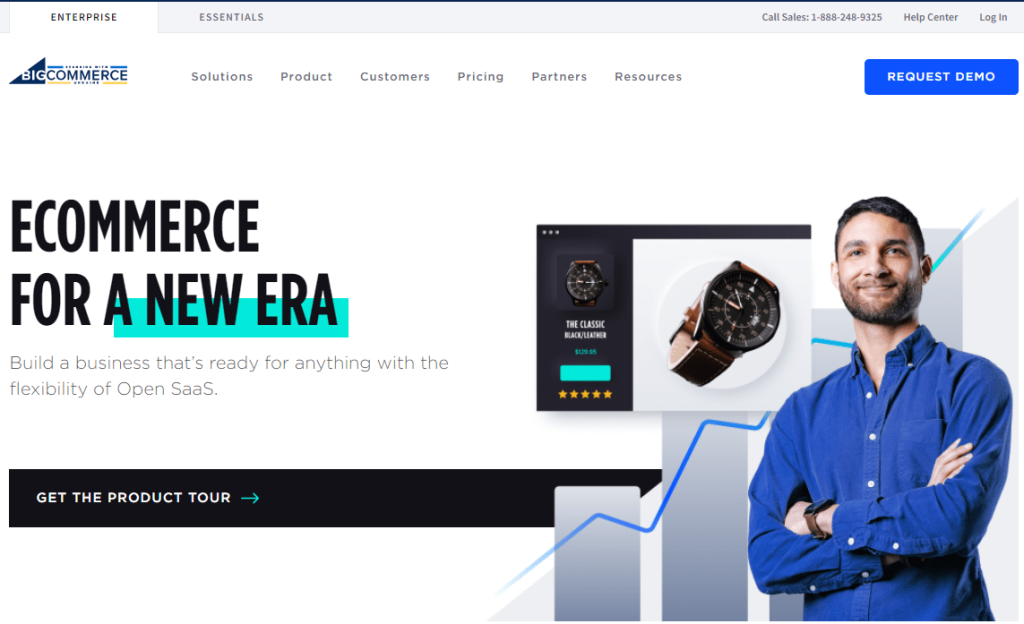
Since the platform offers advanced tools, it can be much more complicated and inflexible for beginners. Compared to other platforms, it has fewer integration options, making it harder for you to expand your store’s capacity. One of the biggest drawbacks of BigCommerce is that they charge you additionally if you go beyond your sales limit. Luckily, they offer a free trial, so it would be better to try it thoroughly before going for the paid plans.
Pros
- Advanced e-commerce management tools
- Plug-in POS integrations make your selling easy.
- Streamlined checkouts for customers
- Industry-leading marketing solutions
- 15-day free trial with credit card required
Cons
- Pricey themes
- Fewer templates options
- Complicated for beginners
Pricing
BigCommerce Standard plan costs around $29.95/month, Plus plan starts at $79.95/month, and the Pro plan starts at $299.95/month. There is an Enterprise plan for large businesses that comes with a custom. Pricing.
4. Weebly
Weebly is an online e-commerce website builder owned by Square, American digital payments and financial services company. All the sites you are going to make will be fully integrated with Square’s POS system so you can sell your products both online and offline.
Weebly comes with a drag-and-drop editor to help build your own website or store, even if you have no experience. Weebly has two pricing models, one for online stores and another for website building. You can simply build your website and start selling or connect with a custom domain to start your store.
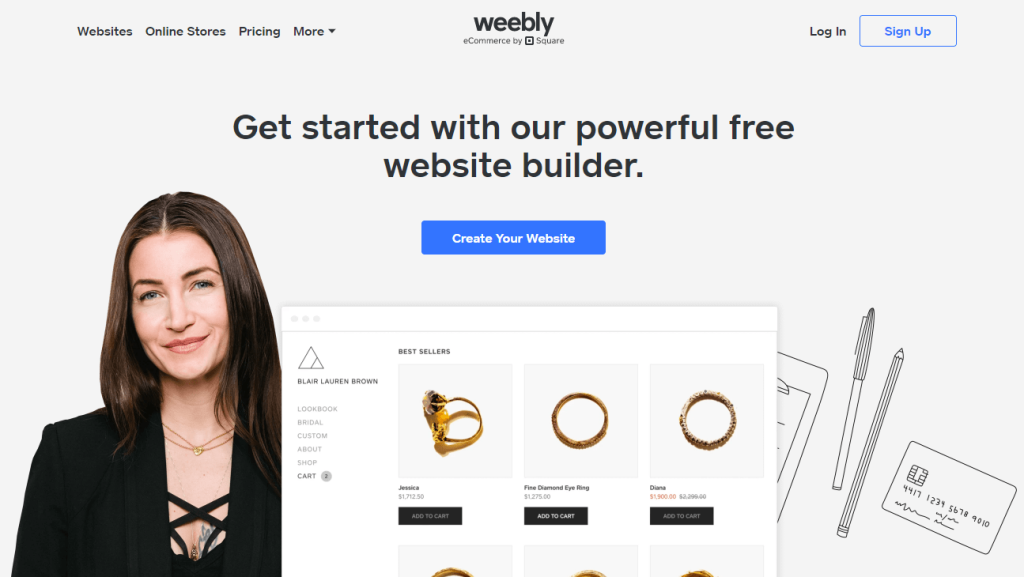
If you create your website with Weebly, you can take advantage of features such as customizable email templates, product research, gift cards, and abandoned cart recovery. However, they don’t have a lot of store customization options and advanced features like multi-language or currency support, creating backups, and advanced SEO.
Using Weebly would be a lot easier if you set up Square as your payment processor, and you can also integrate your store with tons of existing tools.
Pros
- It has a user-friendly interface.
- Weebly offers both online and offline selling features.
- Customize email templates according to your needs.
- Send reminders to customers with abandoned cart recovery.
- Access your online store from your phone.
Cons
- Lack of advanced eCommerce features
- Limited customization and extension tools
Pricing
Weebly’s Pro plan starts at $12/month, and if you want to unlock advanced e-commerce features, you can try Business and Business Plus plans at $25/month and $38/month respectively.
5. Adobe Commerce
Originally known as Magento, Adobe Commerce is an ultimate solution for entrepreneurs and developers. As long as you have the skills, the self-hosted platform offers great flexibility and customization. Running a store on Adobe Commerce requires advanced development and coding skills because if you stumble upon any issue, you will have to fix it by yourself.
If you’re ready to face such challenges, Adobe Commerce will offer you tons of features you can use to run your store globally. The platform offers you features such as in-depth inventory management, customer segmentation, integration with other sales channels (like Amazon), and the ability to stage your sites.
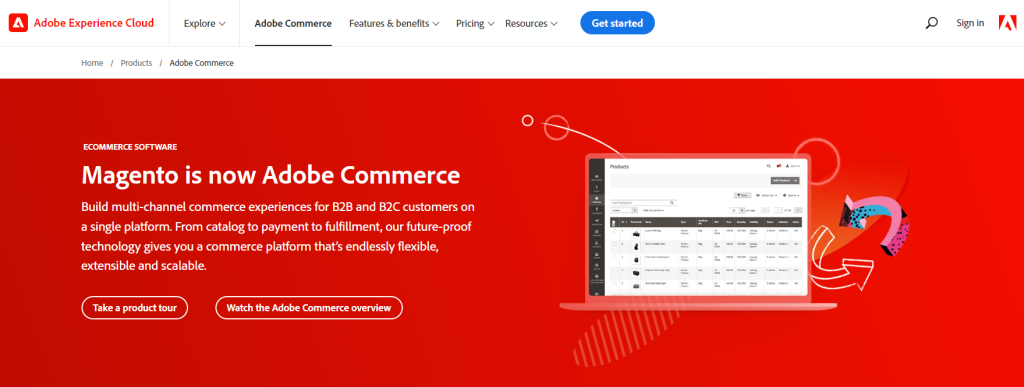
The platform also lacks some features in creating a multichannel strategy, which means it is not a great option if you plan to sell globally. You can still use Adobe Commerce’s advanced features by hiring at least one developer in your team. It also offers an intelligent commerce feature powered by Adobe Sensei AI, which helps you analyze and automate back-end workflows.
Pros
- Multi-brand solutions
- Integrated B2B functionality that offers the best buying experience
- Powerful page builder to create a responsive website.
- Optimized performance
- PCI compliance for secure checkouts.
Cons
- Advanced coding and development skills required
- Complicated for beginners
Pricing
Adobe Commerce only offers one plan, which is Commerce Pro. You can get personalized pricing according to your needs.
6. WooCommerce
WooCommerce is a popular plugin for WordPress, so bloggers and content writers are pretty familiar with this platform. WooCommerce offers an excellent opportunity to bloggers who wish to sell through their WordPress or self-hosted blogs. The platform offers plug-and-play tools & features, so it won’t be hard to add eCommerce functionality to your websites.
Since WordPress works on a CMS system, a lot of selling features will rely on integrations. You can run single or multiple stores simultaneously at affordable prices. WooCommerce also comes with Bluehost WordPress builder. You can use its simple drag and drop builder to build your website with no specific coding required.
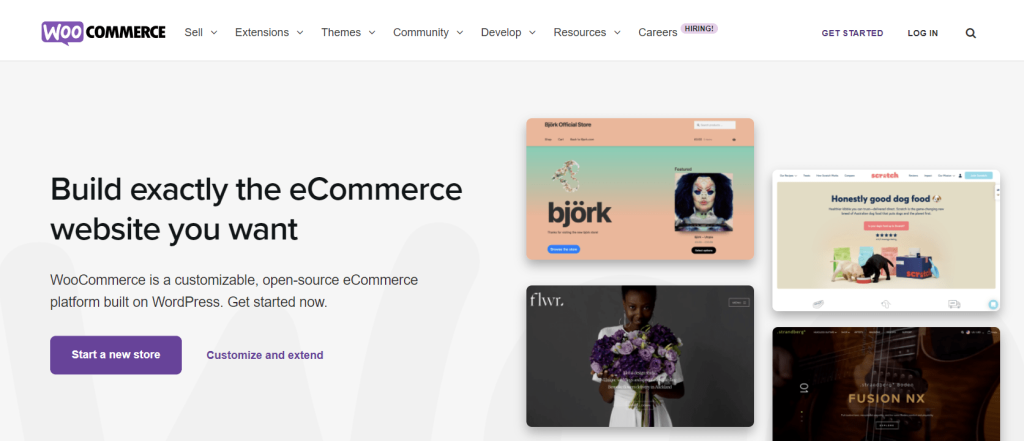
WooCommerce offers a variety of extensions and store management tools that will help you grow your business within time. As you manage everything, you are responsible for fixing the problem on your own if something happens. Also, WooCommerce has a history of breaking down, so you better be careful with your websites.
Pros
- Best for both beginners and professionals
- Open-source and customizable
- Almost everything is plug and play
- Free SSL and domain
- Site monitoring and analytics
Cons
- High maintenance required
- Premium extensions come with paid plans
Pricing
WooCommerce is a free-to-use plugin for WordPress. Creating an eCommerce won’t cost you money, but if you want to increase your selling potential, you can add extensions, plugins, and apps. The pricing for these add-ons starts from $0 to $299 on a monthly or yearly basis.
7. Squarespace
Squarespace is another website builder platform that comes with e-commerce features. Squarespace does have a drag and drop editor, but like Wix, it also requires a little technical knowledge. It is a hosted platform, so you don’t have to worry about website maintenance.
To unlock the e-commerce features and sell online, you must upgrade your plan from basic to premium. After upgrading your account, you get access to features such as cross-platform selling, customized order notifications, and express checkout. It has a massive catalog of extensions and add-ons that will help you grow your store. Going for the more expensive plan will unlock more advanced features like subscription products, abandoned cart recovery, and gift cards.

Setting up Squarespace might be easy, but it demands time and patience before selling online. The platform is only integrated with Stripe and PayPal, so you’ll be limited in terms of payment options. They offer 24/7 priority support, so you can contact them to get your problems fixed. They also offer beautiful templates which can be customized according to your brand.
Pros
- Cross-platform selling to increase your sales.
- Express checkout for an easy and fast checkout process.
- Giant catalog of extensions and add ons
- Customize templates according to your brand.
- No transaction fees
Cons
- E-commerce is only available with premium plans
- No phone support
Pricing
Squarespace’s Personal plan costs you $16/month, the Business plan will cost you $26/month, and Basic Commerce starts at $30/month. If you want advanced e-commerce features, you can get the Advanced Commerce plan at $46/month.
8. Big Cartel
Big Cartel is one of the best eCommerce platforms for artistic and creative-type sellers. If you are pretty good with art and creation, you can quickly set up your store and start selling online. The platform offers great features like real-time statistics, product variations, beautiful templates, and custom domains.
Big Cartel is famous for its reliability, affordability, and fast service. They offer a forever-free plan that you can try before going for the premium plan. You can sell up to five products for free to check the platform’s features.
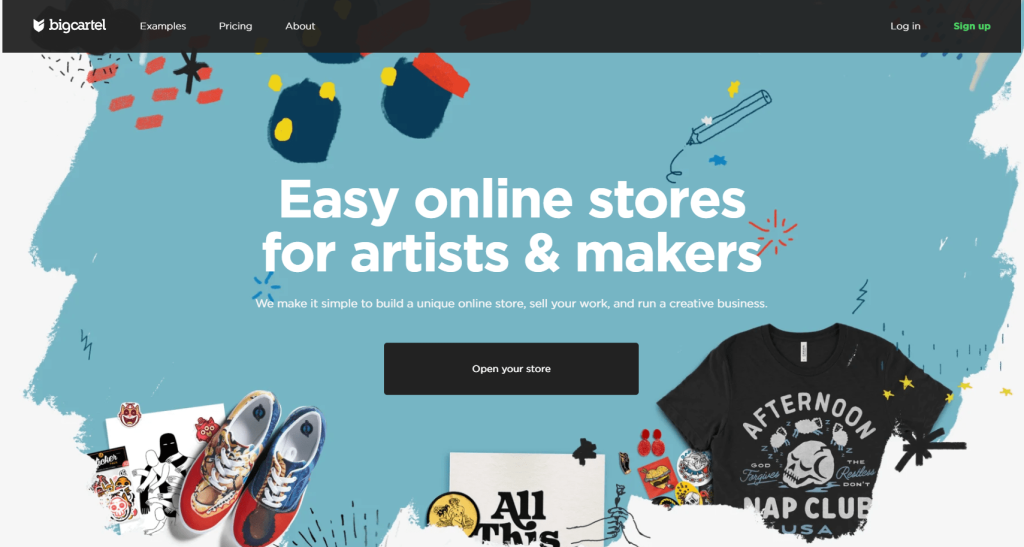
Big Cartel comes with limited customization options, so you can’t say the website you own is totally personalized. And even the highest plan is also limited to selling 500 products each month, so this might not be a great option for big stores. It also lacks advanced e-commerce features, so it is only suitable for small businesses.
Pros
- One of the best platforms for creative-type sellers
- It has a free forever plan that allows you to sell 5 products in a month.
- Product variation
- Real-time statistics
- Incredibly fast and reliable
Cons
- Limited customization options
- No advanced features
Pricing
Big Cartel has only two plans – Platinum and Diamond. The platinum plan costs you $9.99/month for selling 50 products, while the Diamond plan costs 19.99/month for 500 products.
9. PrestaShop
PrestaShop is an open-source e-commerce platform best suited for entrepreneurs who have a few coding skills. The platform proposes three starter packs that you can use to create your online store and start selling within no time. The starter packs include the best business modules that allow you to create product catalogs, gather an audience, and grow on a bigger scale.
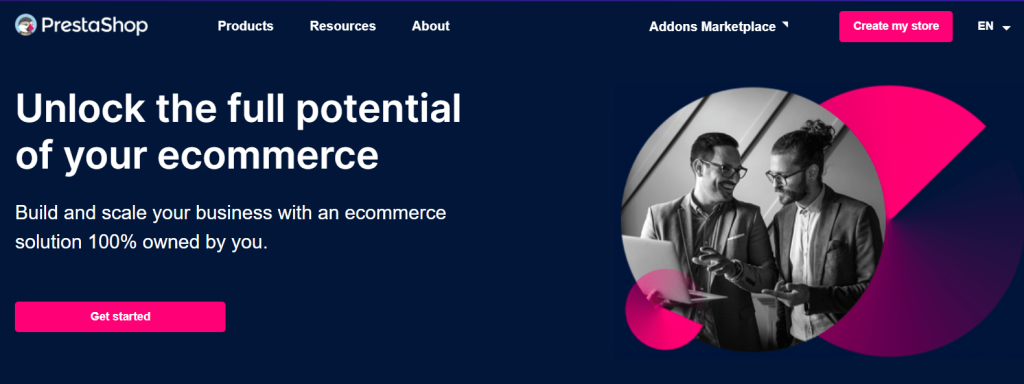
PrestaShop offers access to tons of extensions and add-ons that will help you scale your online store. You will also get standard e-commerce features such as inventory management, cross-platform selling, and store analytics.
PrestaShop gives you more control over the security and privacy of your store. However, the free plan has no customer support, and the paid support can be very pricey. This might not be a great choice for beginners who struggle with site maintenance and designs.
Pros
- An open-source platform just downloads and use.
- Community forums and documentation for support
- Inventory management
- International selling options
- Lots of extensions and add ons
Cons
- Coding expertise required
- No official support
Pricing
PrestaShop is free to use but you can upgrade your account at custom rates to get advanced eCommerce features.
10. Zyro
If you are just starting an eCommerce business, then you will need a tool that can show you the ropes and help you build your dream store, and Zyro is that tool. With this eCommerce tool, you can build a beautiful and completely functional eCommerce store, and you don’t even have to write a single code. You can start building your store right away using its drag & drop feature.
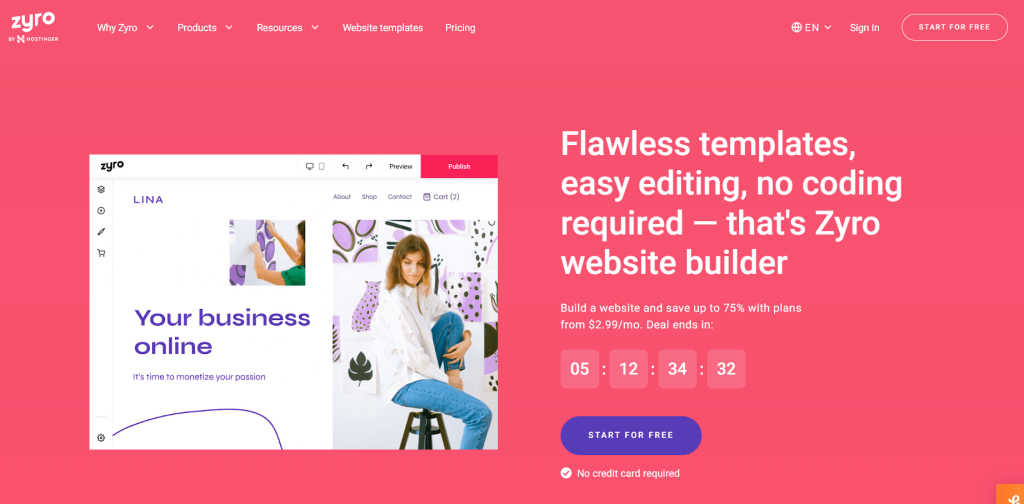
With this tool, you can sell your products on your eCommerce store, Instagram, Amazon, and Facebook. It will make sure that your products get the visibility they deserve. To help your customers buy your products with ease, they support multiple payment methods. You can embed these payment methods in your checkout section. Zyro has all the features that an enterprise or small business will need to run its eCommerce store smoothly.
Zyro comes with an eCommerce builder, which allows you to choose a template from its template library. It has a variety of templates, from simple to complex. It also comes with an order & inventory management tool that can help you track your orders and existing items in your inventory.
Pros
- All the features are streamlined in a dashboard, making it easier for beginners to navigate.
- Abandoned cart recovery & product upselling feature to help you boost your revenue
- More than 70 payment methods are available.
- Customer support offers quick responses and provides quality service
- The loading time of your eCommerce website is great with Zyro’s eCommerce website builder
Cons
- Very less integrations are available.
Pricing: There are three pricing options available on Zyro. The website plan costs $11.99/mo, the business plan costs $14.99/mo, and the advanced store plan costs $39.99/mo. They also offer a 30-day money-back guarantee.
11. Square Online
Square Online is another name on our list as one of the best eCommerce platforms, mainly because it allows you to sell anything, even with a free store. You can easily turn an offline business into an online business with the help of Square’s website builder and a free eCommerce website. You don’t need any coding to use its website builder, and you can quickly create your website using its website kits & publish it on the web.
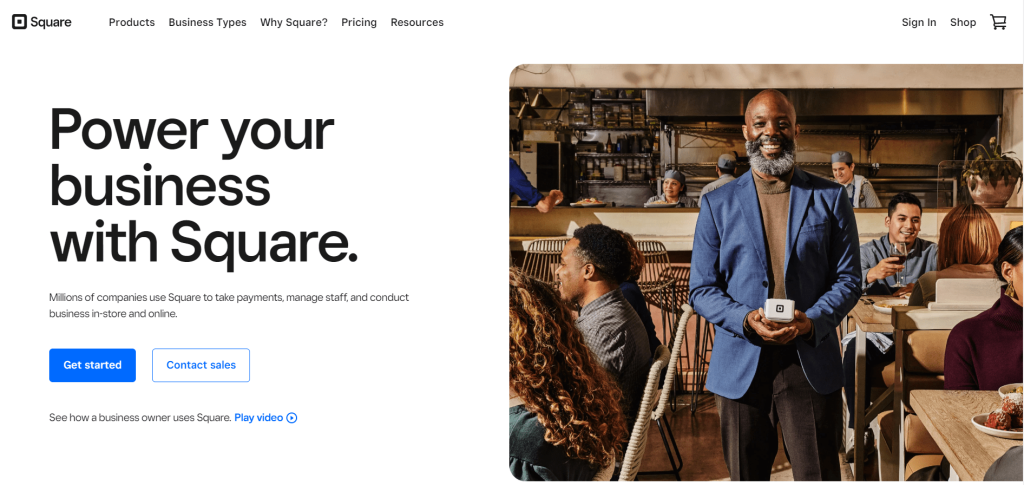
It also allows you to migrate your items from an existing online store. You can Square Online for all types of businesses such as restaurants, services, and retails. You can grow your reach using seamless integrations with Google, Facebook, Instagram, and so on. It also comes with in-built SEO tools, which makes it easy for visitors to find your online store on search engines. You can also receive payments through many payment methods securely.
Pros
- You can set up your store within a few minutes with Square’s website builder.
- Square Online supports all types of businesses, so you don’t need to worry about finding tools for your business.
- You can find all types of payment methods on Square Online.
- The website designs you will find on Square are specifically designed to bring in more customers for your online store.
- In-built SEO tools help your website in ranking on search engines.
Cons
- There are very limited customization options available on Square Online.
Pricing: You can create your online store for free on Square Online; you will only need to pay when you’re receiving payments. There is a plus plan available which costs $29/mo+processing fees and gives you all the advanced features.
12. Ecwid
If you are looking for a white-label eCommerce platform where you don’t have to start from the very beginning to start your online store, then Ecwid is the best option for you. It gives you the option to add your store to your existing website. You can also use Ecwid’s one-page website option to create an online store from scratch, but it won’t take you long to create and launch like other eCommerce platforms.
The name Ecwid stands for eCommerce widget because it is designed for websites that already exist. For example, you can add the online store capability to sell your exclusive products on your WordPress blog with Ecwid. The best part about Ecwid is that if you are planning to sell up to 10 products, then you can get started with it for free.
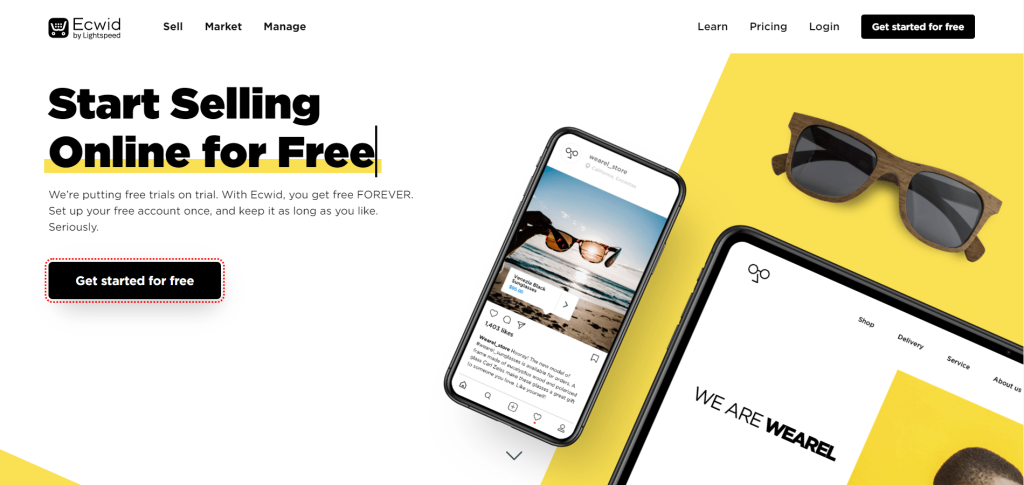
As soon as you create an account on Ecwid, you will get an onboarding checklist to help you set up. More than 1.6 million small businesses are already using Ecwid to sell their products. You can also sell across multiple channels like Instagram, Facebook, Amazon, and eBay with Ecwid. It is really easy to set up Ecwid if you are using a website on WordPress, Joomla, or Drupal.
Pros
- You don’t have to pay any transaction fees to Ecwid whenever you make a sale.
- Ecwid makes the checkout process really smooth, so your customers won’t face any issues during checkouts.
- Sell across multiple channels in the paid plans of Ecwid.
- Sell through a branded mobile app and also in person with Ecwid’s unlimited plan.
- An inventory management tool is available on Ecwid’s paid plans to help you keep track of your inventory.
Cons
- Design options are very limited on Ecwid.
Pricing
Ecwid comes with three pricing options. The venture plan starts at $19/mo or $14.08/mo paid annually, the business plan starts at $39/mo or $29.08/mo paid annually, and the unlimited plan starts at $99/mo or $82.50/mo paid annually.
13. Shift4Shop
Shift$Shop, previously known as 3dcart, is an all-in-one eCommerce platform that caters to all types of businesses by providing them with a set of tools and features they need to run a fully-fledged online store. The platform includes tools such as website building, hosting, marketing, payment processing, inventory management, and many other eCommerce tools, making it a one-stop solution for online sellers.
Shift4Shop offers a free plan to users, which includes all the essential eCommerce features you need to create and run an online storefront. Unlike Shopify and WooCommerce, Shift4Shop doesn’t offer limited access to the crucial tools forcing you to upgrade to a paid plan. It can be a great opportunity for individuals who are low on budgets. They can start and run their online store as long as they want and upgrade when they need exceptional growth.

Shift4Shop offers over 100 customizable and professional-looking themes and templates. The best part, all of them are free to use. Users can pick a powerful theme that relates to their business niche and needs. The platform supports over 200 payment gateways and processors, so you can accept payment from customers in their preferred ways. Premium plans include many advanced features and automation tools that will help sellers grow their businesses exponentially.
Pros
- Free platform with advanced eCommerce features
- Sell unlimited products
- 100+ free and customizable themes and templates
- Integration with third-party eCommerce apps and add-ons
- Built-in marketing features
- 24/7 customer support via email, live chat, and phone
Cons
- Only available for the US sellers
- Limited customizations compared to other tools
Pricing
Shift4Shop’s free plan allows you to sell 100 products per month. Its Basic plan costs you $29/month, while the Pro plan costs you $229/month. Subscribing to the annual plan gives you a 10% discount on the monthly price.
14. Volusion
If you are planning to start a dropshipping business, then Volusion can be the best option to create your online store. The interface of Volusion is very user-friendly and straightforward. It has many free themes that will fit your niche easily, and using its drag-and-drop website builder, you can create your online store in no time.
Volusion has dedicated dropshipping tools that can help you configure the cost of supplier and shipping without you having to do much. You also get abandoned cart reports that can help you create your email marketing strategies. Volusion allows you to add product ratings and reviews on your products, meaning you can show your audience whenever someone leaves a review and rates your product.
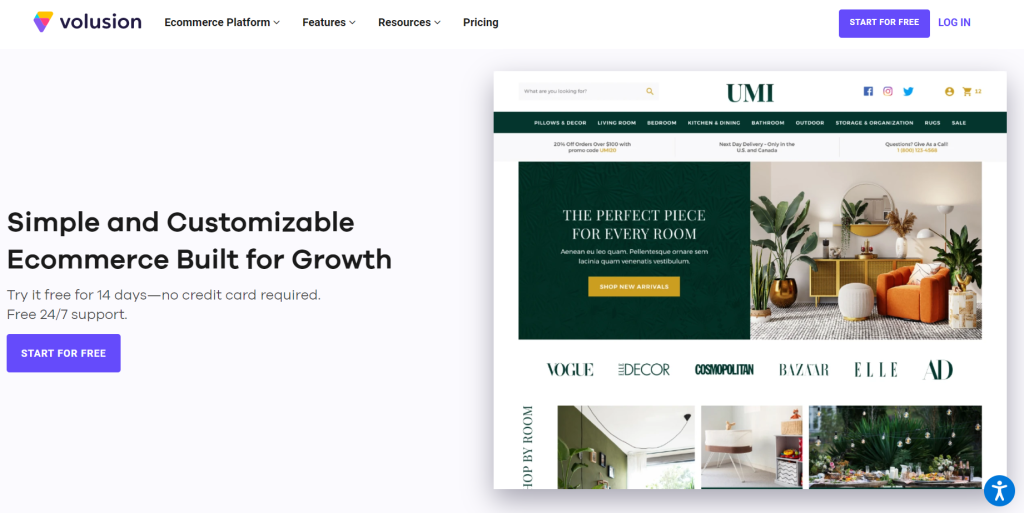
It comes with an inventory tracker that keeps track of your inventory, and you can also set notifications for low stock. Using Volusion’s analytics tool, you can find out what changes your business needs and how your business is performing. Volusion also has a mobile app that you can use to run your online store on the go.
Pros
- Volusion helps its sellers become PCI-compliant so they can securely receive payments from their customers.
- It comes with advanced features like an inventory tracker, barcode generator, and a store management app.
- Volusion also has SEO features allowing you to make your pages SEO-friendly.
- You can use third-party payment integrations with Volusion.
- Volusion has a streamlined onboarding process to help you get started quickly.
Cons
- Volusion has very few free themes, and paid themes are a bit expensive.
Pricing
Volusion offers three pricing options. The personal plan costs $35/month or $31.50/month, paid annually. The professional plan costs $79/month or $71.10/month, billed annually. The business plan costs $299/month or $269.10/month, billed annually.
Related Read:
Conclusion: Shopify is the #1 eCommerce Platform
So, this is my handpicked list of the best 14 e-commerce platforms. Starting an e-commerce store takes a lot more than having a good idea. Selecting a decent platform to sell also plays a vital role in your success. However, the platform you choose also depends on which type of products you are going to sell and the size of your business.
This list is pretty much explanatory. You can choose the best according to your affordability and business size. Above all, Shopify is one of my favorites that offers excellent opportunities for both beginner and professional merchants. But in the end, it all depends on choices. After all, it is your business, and it is your responsibility how you are going to handle it.
- Shopify 3 Months For $1 (DEC 2025) – 90 Days Trial - October 3, 2025
- Helium 10 Free Trial (2025) — Access Premium Features - September 4, 2025
- Jungle Scout Free Trial (2025) — Get 7 Days Access Now - September 4, 2025

